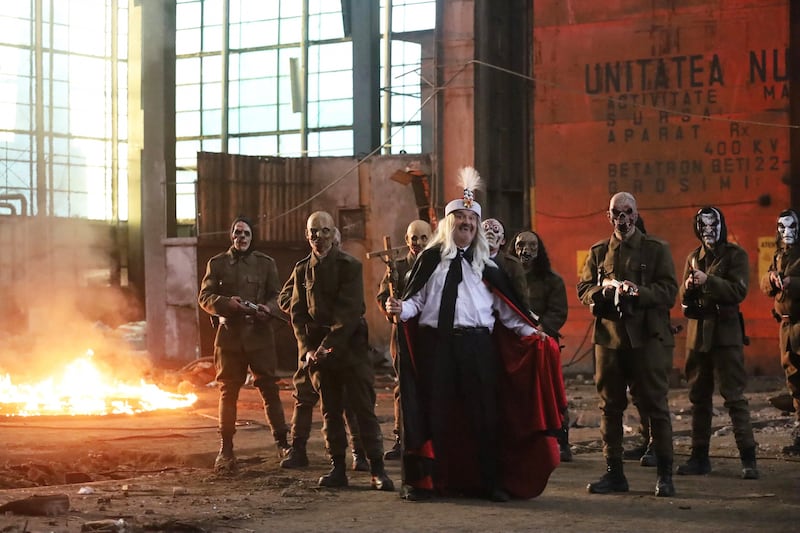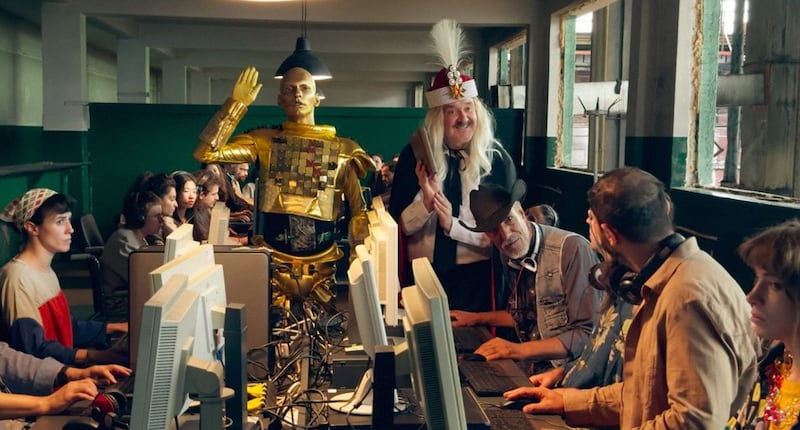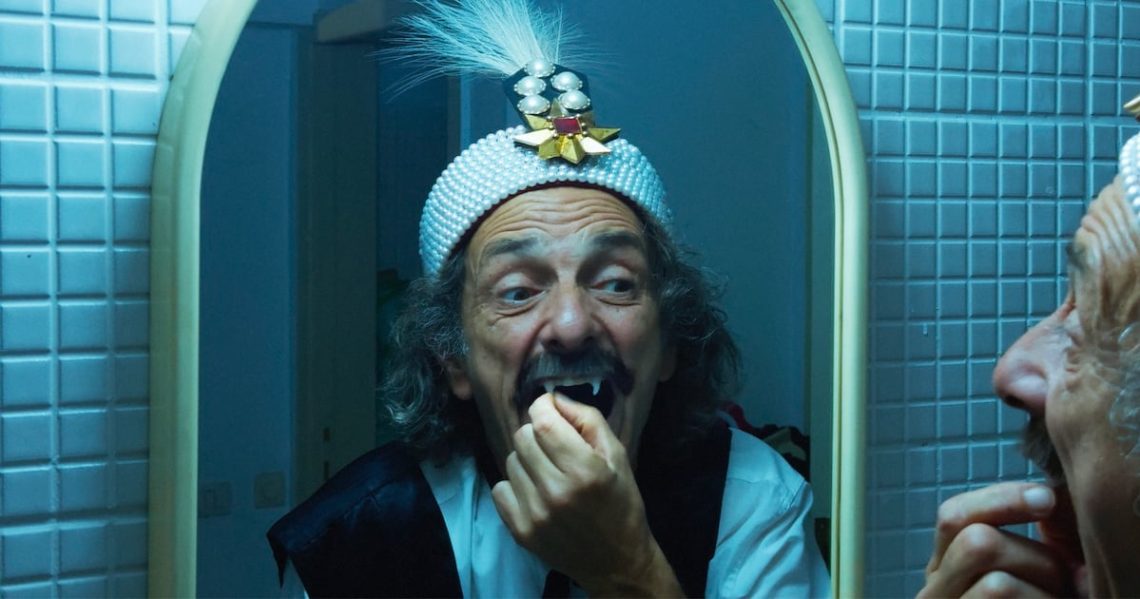A.I. is vampiric in Dracula—and so too is our modern culture of depraved sex, violence, and exploitation, all of which prove juicy targets into which writer/director Radu Jude sinks his satiric teeth.
Using Bram Stoker’s horror classic as the framework for a scathing takedown of modern technology as it pertains, in particular, to cinema—not to mention the brutality and callousness of capitalist and fascistic states alike—the Romanian firebrand’s second film of 2025 (alongside Kontinental ’25) is a raucous mélange of the demented and the degrading, indulging in the very garish, grotesque, X-rated madness it condemns.
Regardless of its saggy middle section, his three-hour critique is a profane button-pushing riot.
Of a piece with 2021’s Bad Luck Banging or Loony Porn and 2023’s Do Not Expect Too Much from the End of the World, Dracula—in theaters Oct. 29 following showings at the Locarno and New York Film Festivals—begins with a montage of A.I. images of Vlad the Impaler that, whether male or female, pronounce, “I am Dracula, you can all suck my d—.”
This is the handiwork of Jude’s on-screen proxy, an unnamed filmmaker (Adonis Tanța) who, at a table with a tablet in hand, explains that he plans to utilize the latest and greatest artificial intelligence—dubbed Dr. A.I. JUDEX 0.0—to devise a “super-commercial” new cinematic vision of the vampire.
The main story he has to tell, however, is a far cry from Stoker’s original. It concerns a dinner-theater nightclub where an MC (also played by Tanța) narrates a bawdy version of Dracula in which an aged Count gropes a topless Nina, after which the elderly actor prostitutes himself for 1500 euros to a diner with a Popeye tattoo on her breast that makes her nipple look like the sailor’s erect member.

This is bonkers, as is the rest of the vignette, with the Count and Nina subsequently chased through the village by their stake-wielding audience. While such shenanigans are initially playful, they soon turn serious, although before that shift, Dracula leaps this way and that, first by riffing on the links between art and commerce via snippets from F.W. Murnau’s seminal Nosferatu that are embellished with spam ads for penis enlargement services and Dracula “tours.”
There’s also a segment about an older woman at a clinic where famous previous clients—including Charlie Chaplin, Lillian Gish, Richard Nixon, and Steven Spielberg—sought youth-regenerating treatment, and where she’s accosted by a Vlad who leaps off a movie screen and forces her to pleasure him orally. Shortly thereafter, the filmmaker asks his A.I. to recreate Francis Ford Coppola’s Bram Stoker’s Dracula but with extra sex, and the result is a barrage of monstrous snapshots of mutant Counts and Ninas that are more terrifying than anything found in Stoker’s novel.
Dracula constantly employs A.I. to highlight the tech’s plagiaristic awfulness; to a tee, the film’s digital tableaus are defined by their unoriginal, warped, inhuman ugliness. Jude makes clear that he views artificial intelligence as a horrid fiend that feeds on the blood of artists, such as with a remake of a (fake) Romanian romance (titled Just So) about a delivery driver and the young woman he aggressively woos—a tale that’s interspersed with cutaways to kitschy wheat-field scarecrows and concludes with a hilariously cheesy waterfall bit. Later chapters involving hordes of vampire bats and zombies are similarly awash in bottom-of-the-barrel digital effects, fleshing out the proceedings’ censure.
Jude, however, is no one-trick pony; as he slams A.I. for its imitative lousiness, Dracula additionally takes aim at just about everything in its vicinity.
Be it a group of diners discussing, mid-hunt, the bloodthirsty torture tactics of Russia, the United States, and France, Just So’s female protagonist telling a story about a farm’s cycle of violence, or another version of Dracula fighting union workers at the video game sweatshop over which he lords—the last of which is a digression that even Tanta’s filmmaker admits is an on-the-nose dramatic equation of capitalism and vampirism—the auteur presents a 21st-century turned cruel and crass by economic forces.
Yet at no time does Jude resort to pedantry; on the contrary, his rollicking feature is like a shotgun blast of satiric buckshot, its mad condemnation sprayed far and wide.
Despite opening and closing hours that lean heavily into Jude’s trademark quick-hit storytelling, Dracula loses steam during its middle passage—an A.I. remake of Romania’s first Stoker adaptation (from 1938). Staged with campy, in your-face artificiality (for example, an inn’s patrons are cardboard cut-outs), this 50-minute interlude—boasting a Dracula with a Muppet-y face—goes on too long and repeats too many of the ideas and gags already tackled in prior sections.
Moreover, Jude’s fondness for sloppy b—jobs, masturbation, and kindred acts occasionally results in diminishing returns; for all its boundary-pushing humor, a late Brechtian fable about a crop of magical penises (based on author Ion Creangăa) grows tiresome fast. Still, like so much of the material, its extravagant vulgarity is the point, designed to reflect, and skewer, the crudeness of our present reality.

Overflowing with sharp, scornful silliness, Dracula is part and parcel of Jude’s prankster cinema. From fights shot in goofy faux-slow-motion to references to Karl Marx, the Vietnam War, OnlyFans and TikTok, it’s an overstuffed hodgepodge of historical and contemporary viciousness and voraciousness, and at a certain point, its distended runtime becomes its own sort of joke—a manifestation of 2025’s gross bloat and insatiable hunger.
Jude does what A.I. does, taking preceding versions of Dracula (among other movie and music detritus) and smushing them together to fashion a repellent new beast. The difference, though, is that the director’s unholy concoction seeks not to accurately approximate (or improve) but, rather, to highlight the foolishness of such a techno-endeavor.
Dracula is both the embodiment, and a blistering denunciation, of all that is coarse, callous, and chaotic about today. Better yet, it’s never predictable, concluding on a note of tender, moving hopefulness that’s as surprising as its gruesome and pornographic mayhem is shocking, stinging, and amusing.
The post This X-Rated ‘Dracula’ Is the Wildest Version You’ll Ever See appeared first on The Daily Beast.




